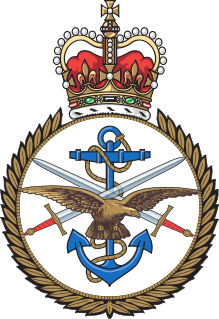
The British Armed Forces, also known as Her Majesty's Armed Forces, are the military services responsible for the defence of the United Kingdom, its overseas territories and the Crown dependencies. They also promote Britain's wider interests, support international peacekeeping efforts and provide humanitarian aid.

The Ministry of Finance, Revenue & Economic Affairs or Ministry of Finance is a ministry of the Government of Pakistan tasked to ensure a strong Pakistani economy by developing policies of sound economic management and providing expert advice to the government.

The Ministry of Defence Police and Guarding Agency (MDPGA) was an organisation within the United Kingdom's Ministry of Defence between 2004 and 2013.
The Veterans Agency was an Executive Agency of the UK government's Ministry of Defence (MoD). It was amalgamated into the Service Personnel and Veterans Agency (SPVA) on 2 April 2007 under the brand Veterans-UK.
Pay Commission is set up by Government of India, and gives its recommendations regarding changes in salary structure of its employees. Since India's Independence, seven pay commissions have been set up on a regular basis to review and make recommendations on the work and pay structure of all civil and military divisions of the Government of India. Headquartered in Delhi, the Commission is given 18 months from date of its constitution to make its recommendations.

The Ministry of Defence is charged with coordinating and supervising all agencies and functions of the government relating directly to national security and the Indian armed forces. The Ministry has the largest budget among the federal departments of India and currently maintains fifth in military expenditure, among countries of the world.

Defence Equipment and Support (DE&S) is a trading entity and joint-defence organisation within the UK Ministry of Defence. It began operating on 2 April 2007 following the merger of the MoD's Defence Procurement Agency and the Defence Logistics Organisation, under the Chief Executive Officer of Defence Equipment and Support.
The Ministry of Personnel, Public Grievances and Pensions is a ministry of the Government of India in personnel matters specially issues concerning recruitment, training, career development, staff welfare as well as the post-retirement dispensation.
Joint Personnel Administration (JPA) is the intranet-based personnel administration system used by the British Armed Forces from April 2006 onwards, replacing the separate payment and administration teams from each of the three Services. Despite the ability to carry out over 40 formerly paper-based functions, from checking postings to payslips, the system has been heavily criticised.

The Service Personnel and Veterans Agency (SPVA) was an executive agency of the UK Ministry of Defence. The SPVA provided personnel, pensions, welfare and support services to members of the UK Armed Forces and veterans and their dependents. It was formed on 2 April 2007 by merging the former Armed Forces Personnel Administration Agency (AFPAA) with the Veterans Agency.

The Armed Forces Personnel Administration Agency (AFPAA) was a UK Ministry of Defence Tri-Service Defence Agency from April 1997 until it was merged into the Service Personnel and Veterans Agency on 2 April 2007.
DBS National Security Vetting is a unit within the Defence Business Services (DBS) organisation of the United Kingdom's Ministry of Defence (MoD). It is responsible for vetting employees of the British Armed Forces, MoD, civil servants, defence contractors, and certain other government departments and organisations who work on contracts with certain government departments. It was formerly an executive agency known as the Defence Vetting Agency (DVA) until 1 October 2011, when its executive agency status was removed and it was transferred into the new DBS organisation.
The Ministry of Defence (MoD) is a Bangladeshi government ministry. The MoD is headed by the Minister of Defence, a civilian and member of cabinet; the post is usually held by the Prime Minister of Bangladesh, who also serves as the President's second-in-command of the military. The MoD exercises supreme command authority over the Bangladesh Armed Forces.
One Rank One Pension (OROP), or "same pension, for same rank, for same length of service, irrespective of the date of retirement", is a longstanding demand of the Indian armed forces and veterans. The demand for pay-pension equity, which underlies the OROP concept, was provoked by the exparte decision by the Indira Gandhi-led Indian National Congress (INC) government, in 1973, two years after the historic victory in the 1971 Bangladesh war, and shortly after Field Marshal SHFJ Manekshaw retired, to decrease armed forces pensions by 20–40 percent, and increase civilian pensions by 20 percent, without consulting armed forces headquarters.

Brigadier Michael John "Mike" Stone is a retired British Army officer, former Director of Information of the British Army and former Chief Information Officer of the Ministry of Defence. He is currently the Global Head of Government Technology Transformation at KPMG. In 2015, Stone made the UKtech50, where he was ranked the 12th most influential person in the UK IT Sector.
Rank Pay is a scheme implemented by the Rajiv Gandhi led Indian National Congress (I) Government in 1986, in the wake of 4th Central Pay Commission(4CPC), that reduced the basic-pay, or grade pay, of seven armed armed officers ranks of 2nd Lieutenant, Lieutenant, captain, majors, lt-colonel, colonels, and brigadiers, and their equivalent in the Air Force and the Navy by fixed amounts designated as 'rank-pay'. The reduction in the basic-pay, the established basis of determining rank equivalences between armed forces officers and civilian and police counterparts, altered long established historical grade-pay equivalences or parities between armed forces officers and police officer, which was an accepted principle since 1947 for determination of armed forces grade pay, and which was 'further cemented' in 1973, by the 3 Central Pay Commission (3CPC). The reduction in grade-pay apart from causing asymmetries in rank equivalence between the officers from the Indian Police Service and armed forces affected the basic pay, allowances, entitlements, promotion prospects, status, and pension of thousands of officers in the service in January 1986, and the decades after that. In 2012, reduction in armed forces grade-pay, which was a subject of litigation since 1994, was declared illegal by the Supreme Court of India, which in a landmark judgement ordered the government to pay arrears to the more than 20,000 affected officers of the armed forces.
Defence pensions are pensions paid from the Defence Services Estimates. Approximately 36 percent of amount budged for defence pensions is on account of defence civilians. The Defence pension bill for 2015 – 16 was ₹ 54, 500 crores, including pension outlay for about 400,000 defence civilians, and about Rs1000 Crores on account of allowances and establishment of Ministry of Finance personnel attached to MOD. On an average a defence civilian pensioners cost five times more than military pensioner. The per capita expenditure on 25 Lakh military veterans is approximately Rs. 1. 5 Lakhs annually, in comparison with ₹ 5.38 Lakhs a year for civilian pensioners paid from the defence services estimates.The per capita bill on account of defence civilian pensioners is higher mainly because defence civilian officers serve longer, reach the highest grades in the pay scales, are eligible for One Rank, One Pension (OROP) pensions, and are entitled to Non Functional Upgradations (NFU).
The 7th Central Pay Commission (7CPC), constituted in February 2014 to review the principles and structure of emoluments of all central government civilian employees including defence forces in India, submitted its report on 19 November 2015. 7CPC's recommendations affects the organization, rank structure, pay, allowances and pension, of 13,86,171 armed forces personnel.page 105, para 6.2.2[3]









